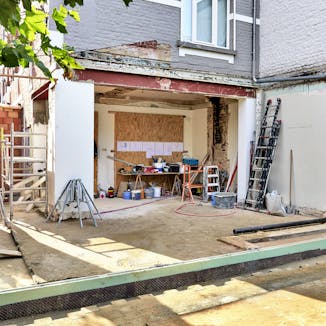Get the latest rates for home renovation loans, find quotes and check your eligibility with no impact on your credit score.
Get a decision within an hour
Quote won’t affect your credit score
Poor credit & arrears accepted







These products are only available via a broker and can't be applied for directly
We're on a mission to improve the finances of the nation by helping you to spend wisely and save money



We're on a mission to improve the finances of the nation by helping you to spend wisely and save money



By Matt Fernell, Editor at Finance.co.uk.

A renovation loan can help you cover the cost of home improvements that could boost your home’s value. Here’s how to find the right home renovation loan for you.
We always check your eligibility with a range of top lenders before finding your quotes so you can apply with confidence.
No impact on your credit score
Poor credit history accepted
Get a decision within an hour
Quotes tailored to your situation
Compare quotes from a range of trusted lenders
Using a loan broker helps you find the right loan for your renovations.
So that we can show you the best renovation loan rates available to you, we just need to understand:
How much you want to borrow
The reason you’re borrowing for
The loan term you want
This information will help you find loan deals that would be right for you. If you’re looking to borrow £10,000 or more, we’ll ask you a few questions about your property:
Are you a homeowner
What’s your current address
What’s your mortgage balance
What’s the approximate value of your property
We’ll be in touch within an hour with a decision and show you quotes for renovation loans tailored to you.
Renovation loans work in the same way as any other loan:
You apply to a lender to borrow the amount you want over a certain loan period
The lender will either accept or reject your application
If accepted, they will offer you an interest rate
Once you agree, they will arrange to transfer the money to your account
You will then need to make monthly payments over the term to repay the loan
There are two main types of home renovation loans you can get: secured loans and unsecured personal loans.
Which type of loan is right for you will depend on the size of the loan you want and your financial situation.
Also known as homeowner loans, this type of borrowing uses an asset, usually your home, as security for the loan. It means you need to be a homeowner to be eligible, but a secured loan allows you to borrow higher amounts of money - some lenders offer loans of up to £2.5 million on a secured basis.
Secured loans are considered a lower risk to lenders because they have the security of using the equity in your property to cover any losses they suffer if you cannot make your repayments.
This is why you can borrow more with a homeowner loan and have a better chance of being accepted if you have a poor credit rating. Here's an in-depth look at how secured loans work.
Unsecured personal loans don’t require you to put down any collateral and allow you to borrow smaller amounts. Therefore, they might be the right option if you’re planning small projects like a new bathroom, kitchen refitting or general redecorating.
Personal loans are usually available for between £1,000 and £25,000, but some lenders may offer more if you have an excellent credit record.
Interest rates are higher than secured loans, but the loan terms on offer are shorter, so the overall cost of the loan could be cheaper. Find out more about personal loans here.
Getting a loan for home renovations is a big decision, so to find the best loan, you need to understand exactly what you need. Before you start your search, work out:
How much you need to borrow: The size of the loan you want can help you work out if you need a secured or unsecured loan. If you need less than £25,000, an unsecured loan could be an option - it may come with a higher interest rate, but your home won’t be at risk if you cannot repay it.
If you’re prepared to risk your home: If you want a loan of more than £25,000, you will probably need to use your home as security. Ensure you are comfortable putting your home at risk before applying for a secured loan.
If you are eligible: Your finances and credit score have a big bearing on how much you can borrow and the rate you can get. When we find you quotes, we perform a ‘soft check’ on your credit record so we can show you the rates you’re eligible for.
Whether you can afford it: Make sure you can afford the repayments now and in the future. Secured loans are often available over a long term, so think about how your financial situation could change before the end of the term.
The loan term you want: The length of your loan has a big bearing on how much interest you’ll pay overall and your monthly repayments. Try to keep the term as low as possible to keep the cost in interest down, but make sure you can comfortably afford the repayments.
How much equity you have in your home: Get an up-to-date valuation and find out your outstanding mortgage balance to work out your equity. If you want a secured loan, you will need to have enough equity to cover what you borrow.
Renovation loans can be a great way to make your home improvement dreams a reality. Renovation finance can:
Help you increase the value of your property through renovations
Allow you to complete renovations more quickly and to a high standard
Mean you can spread the payments over a long period of time
Although a renovation loan comes with several benefits, there are a number of potential drawbacks you should be aware of:
Your home could be at risk if you default on a secured renovation loan
Borrowing over a long term can cost a lot in interest over the term
Late or missed payments could damage your credit score
It’s worth using savings to cover some or even all of your renovation costs if you can afford to. Loan rates are usually higher than savings rates, so it could save you money in the long run and mean you’re not putting your home at risk to borrow.
The information provided does not constitute financial advice, it’s always important to do your own research to ensure a financial product is right for your circumstances. If you’re unsure you should contact an independent financial advisor.
Home equity is the value of the property portion that you own if you have a mortgage. An easy way to understand equity is to subtract the amount you owe from the value of your home. So, if your home is worth £300,000 and you still owe £100,000, the home equity is £200,000.
If you have a home improvement loan secured on your property, you will need to get permission from your lender to sell your house.
Once you have the money in your bank account, what you do with it is up to you. If you don’t use all of the loan on renovations, you could use the rest on anything you like.
A secured loan will only be bad for your credit score if you miss or are late to make your payments. They can be a good way to boost your credit rating. If you’re approved for a secured loan and have poor credit but make your repayments in full and on time, you will be taking steps to help build your credit score.
It will depend on the lender and your circumstances. If you are struggling to keep up with your payments, contact your lender and discuss your situation with them as soon as possible.
They should be able to work with you to come up with a plan to help you manage your loan. This could be by agreeing to a payment holiday or restructuring your repayments to make them more manageable.
It is worth remembering that stopping your payments could increase the overall cost of your loan as you’ll take longer to repay it.
The amount you can borrow will depend on:
Whether you want a secured or personal loan
Your financial situation and credit history
The equity you have in your property
Personal loans generally allow you to borrow up to £25,000, although interest rates can be higher if you don’t have a good credit rating and you’ll have to repay within seven years.
Secured house renovation loans tend to be for anything between £10,000 and £100,000, although you can borrow more if you have enough equity to release from your property.